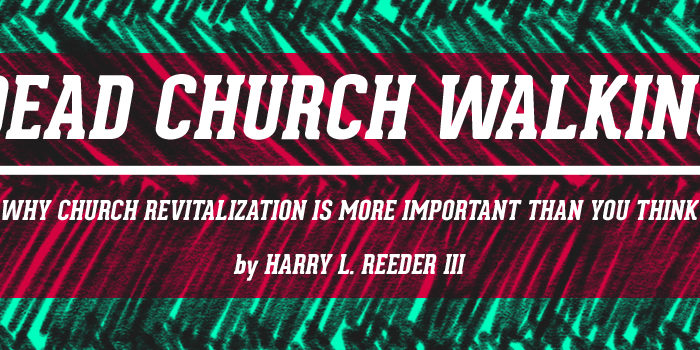
Dead Church Walking (Harry L. Reeder III)
In the new issue of Credo Magazine, “Churchy Gimmicks: Has the Church Sold Its Soul to Consumerism?”, Harry L. Reeder III has contributed an article titled, “Dead Church Walking: Why Church Revitalization Is More Important than You Think.” Reeder is Senior Pastor of Briarwood Presbyterian Church. He is the author of From Embers to a Flame: How God Can Revitalize Your Church.
Here is the introduction to his  article:
article:
In 1980, a young pastor fresh from seminary arrived at his first pastorate and encountered a startling reality. Although thinking he was fully aware of the issues at hand, he soon learned this was not the case. When you get “on site” you soon gain “insight.” Church attendance had diminished from over 1,000 to an average of 55. There were no children’s Sunday School classes because there were no children. The average age in the congregation exceeded 70, and its past had become glorified nostalgia.
On his first Sunday, the service ended at the expected 12:00 hour. As he and his wife made their way to the lobby, amazingly, in spite of the infirmities of age, the congregation had exited and were rapidly emptying the parking lot. The box of church attendance had been checked, and they were ready to move on. There were no sounds of fellowship from lingering crowds, only an empty sanctuary and parking lot within five minutes of the benediction. The pastor, who had gone outside to speak to the departing congregation, was embarrassingly locked out of the church building by the equally rapid exit of the part-time church janitor. After breaking into his own church to obtain his Bible and car keys, along with his wife’s belongings, they looked at each other with an increasing realization of how enormous this challenge would be. But there was more to come.
While all other churches in the area had monthly accounts at the local office supply store, the pastor soon learned his church was excluded and designated as “cash only” due to past payment delays. The first session meeting revealed the likelihood that of five elders, only two had a personal saving relationship with Christ. The other three, while well-meaning, did not savingly “know the Lord.” Of the two who exhibited spiritual maturity, one was transferred within three months, and the other died of leukemia. The church had not met its budget in seven years. But perhaps the most startling event was a phone call from one of the previous nine pastors revealing a tumultuous past. This pastor, while graciously welcoming the new pastor to his charge, asked a strange and probing question: “Did you pray before you accepted this call?” After answering “yes,” the obvious question was, “Why did you ask?” The answer was stunning. He informed the new pastor that he believed the church “had the mark of Satan upon it.” One pastor had been attacked publicly with a knife by his wife after she discovered his marital unfaithfulness with a church member. Another pastor had resigned from the ministry due to prescription drug addiction. Yet another pastor had left the ministry because of his wife’s alcoholism. The caller declined to describe his own experience except to say, “You really don’t want to know what happened to me.” This information, along with other “horror stories,” obviously was not encouraging for a new pastor in his first pastorate. So what did he do?
Read the rest of this article today!
The Evangelical church in the twenty-first century has in many ways absorbed the consumeristic mentality that is so prevalent in the culture. Churches approach worship as if they were selling a product and the attendee were the consumer. Since the product is up for sale, churches must show that their product is more entertaining than anything else the world has to offer. Therefore, churchy gimmicks are the name of the game. Whatever keeps people coming back for more takes first priority and becomes the controlling principle for all things church-related. The preaching must be relevant, the music must entertain, and church events must keep people on the edge of their seat. If the church doesn’t sell itself, then it will be out of business.
In this issue of Credo Magazine we hope to pour an ice-cold bucket of water in the face of the church. No longer can we turn to the culture to decide what the church should be and do. God, his gospel, and his bride are not products to be sold. And those who walk through the church doors on Sunday morning are not customers to entertain. Such an approach makes man the center and treats the church like a business. In contrast, our aim in this issue is to draw church-goers and church leaders back to Scripture, which we believe should be our final authority and guide for worship. In doing so, we must recover the ordinary means of grace that God uses to equip the saints and transform us into the image of Christ.
Contributors include: Brian Cosby, Dennis Johnson, Harry Reeder, Mark DeVine, T. David Gordon, Heath Lambert, and many others.

